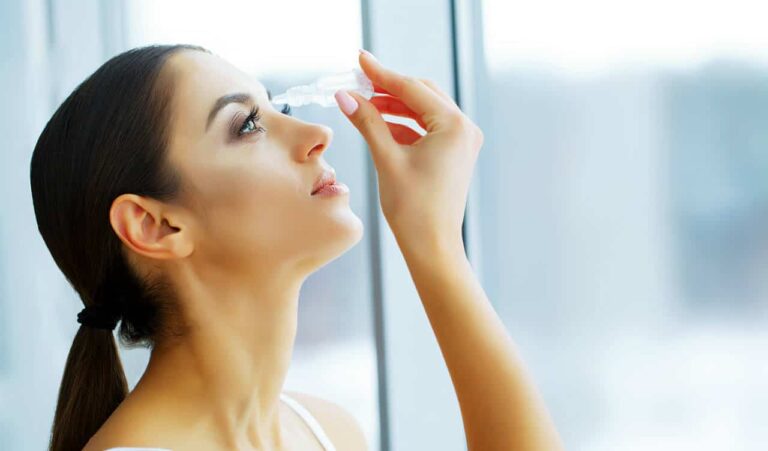What is the first line of defense against dry eyes?
Preservative-free artificial tears are the first line of defense, as preservatives are often a contributing factor to dry eyes. Artificial tears can provide temporary symptomatic relief. Lid hygiene is also an effective way to help manage symptoms. Lid hygiene includes two at-home treatments, warm compresses and lid scrubs.
Most people suffer from an oil deficiency in their tears and warm compresses can help stimulate the oil glands responsible for producing and releasing the oil component into your tear film. Lid scrubs are a way to gently clean your eyelids and lashes to help keep debris and normal bacteria at bay. Some patients may require prescription medications, such as cyclosporine or lifitegrast, also known as Restasis, Cequa, or Xiidra, respectively. There are also dry eye treatments that can be performed in the office to help manage your symptoms.
Are sunglasses good for my eyes?
Wearing UV protective lenses (sunglasses or clear lens) can be beneficial in protecting your eyes and the surface of your eyes. UV radiation may have a role in cataract formation and macular degeneration. Excessive UV exposure can lead to benign and cancerous growths on the surface of the eye.
Will working at a computer screen hurt my eyes?
No, there is no evidence that working at a computer can damage the eyes. However, low light, glare on the monitor, or staring at a computer screen too long can cause the eyes to become fatigued. It is recommended to take frequent breaks to allow your eyes to rest and to use artificial tears to replenish your tear film.
What is dry eye?
Dry eye is a common chronic medical condition that can impact the health of your eyes, your vision, and your lifestyle if left untreated. There are two primary types of dry eye. Evaporative dry eye, which is associated with a deficiency in the oily layer of your tear film and aqueous-deficient, which is associated with a deficiency in the water layer of your tear film.
As part of the examination, the doctor will use several tests and diagnostic tools, including a LipiView Analysis and TearLab Osmolarity test, to assess and identify the root cause of your dry eye symptoms and recommend the best treatment for you.
What are the symptoms of dry eye?
Here are some of the symptoms of dry eye:
- You feel like your eyes are stinging and burning.
- Blurred vision, especially when reading
- Fluctuation in your vision improved with blinking or instilling artificial tears
- There is a scratchy or gritty feeling like something is in your eye.
- There are strings of mucus in or around your eyes.
- Your eyes are red or irritated. This is especially true when you are in the wind or near cigarette smoke.
- It is painful to wear contact lenses.
- You have lots of tears in your eyes.
Having a lot of tears in your eyes with dry eye might sound odd. But your eyes make more tears when they are irritated by dry eyes.
What if I don’t treat my dry eye? Will it get worse?
Dry eye is a chronic, progressive disease that affects the surface of the eye. Without treatments, the symptoms may ebb and flow, but there is likely progressive damage occurring to the front surface of your eye. If left untreated, dry eyes can become dangerous. Excessive dryness can scar the cornea, impairing vision and damaging the tissues. Significant dryness can lead to a greater chance of infection, breakdown of the corneal barriers, and perforation of the cornea.
What causes dry eye?
Dry eyes are caused by a lack of adequate tears. Your tears are a complex mixture of water, fatty oils, and mucus. This mixture helps make the surface of your eyes smooth and clear, and it helps protect your eyes from infection. For some people, the cause of dry eyes is decreased tear production.
Is there a cure for dry eye?
Unfortunately, there is currently no permanent cure for dry eye. Dry eye disease is a chronic condition that can be managed and controlled with regular treatment compliance. Technology has advanced tremendously throughout the last decade to offer new and exciting treatments for dry eye that can help offer more symptom relief and prevent the progression of the disease. Our advanced dry eye clinic is designed to offer our patients a full spectrum of testing and treatment options to battle the effects of chronic dry eye.
What treatments are available to treat dry eye?
There are various treatment options available here at Florida Eye Specialists. Here are a few of the most common treatments:
- Lubrication (artificial tears, gels, and ointments)
- Prescription options: Restasis/Xiidra/Cequa
- Punctal plugs
- LipiFlow
- Intense Pulsed Light (IPL) Treatment
- Microblepharoexfoliation with AbMax
- Surgery on the tear ducts or tear drainage system
In addition to one or more of the above treatment options, your doctor may recommend blinking exercises, warm compresses, fish oil, and flaxseed supplements, and tips to improve lid hygiene to give you the best improvement in your dry eye symptoms.
